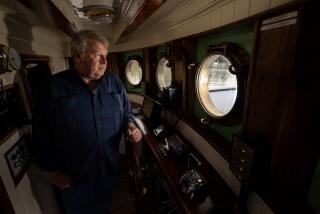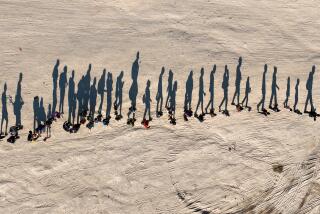‘Rocket’ rounds the final bend
- Share via
“I’VE GOT SOME good news and some bad news,” the Coast Guard official says. “The good news is, you’ve made it to New Orleans. The bad news is, you can’t land here.”
Typical.
I pedaled more than 1,300 miles down the Mississippi River on a raft made of soda-pop bottles, only to be stopped a mere quarter of a mile from my goal by a guy patrolling the river for terrorists.
I slept on a shrub bed of poison sumac for this?
My grandmother is waiting around the next bend at the Audubon Zoo’s boat landing.
“You know what, buddy,” I think, “you’re going to have to shoot me.”
My poor partner, Marc Eriksen, has rafted more than 2,000 miles on this river.
Things looked bad this morning when he threw up in the bayou before we shoved off (bad sausages), but he’s worked hard to make it down the mighty river to New Orleans’ city limits.
We even prettied up for our last day. I put on lipstick, and Eriksen miraculously produced a clean shirt.
But the Coast Guard doesn’t care about extra grooming. They are on orange alert.
“We are just going around the next corner to the zoo!” I yell up at the men massed at the rail of their boat. “Does your terrorism alert extend to the zoo?”
They have no idea. They take pictures of my glowering face and wave us on.
But they follow 10 feet behind, their big cutter hulking over our boat, as if we rigged the “Bottle Rocket” with explosives.
The river never treated us like this. As long as I respected it, it let me do as I pleased.
Unlike the vaguely purposeless life I led in Los Angeles, the existence I forged on the Mississippi gave me a chance to control my own destiny.
The Coast Guard was a depressing sign that all that freedom was about to disappear.
The Mississippi -- choked with scary tanker ships that, if they saw us at all, wouldn’t have been able to stop before running us over -- also was glorious in our final days together.
We started out late each morning, wrapped in layers of humid fog, and strained to see the shapes of shadowy barges groping their way down river.
Towboat workers gave us food. People stopped their cars on the Sunshine and Luling bridges to gawk. Ships refused to run us over. I felt cradled by a river that was at its most dangerous.
I don’t want to say goodbye to Marc either, so I decide to accept his invitation to move in when we get back to L.A.
As Marc says, it’s time to accept fate and realize that we will be saddled with each other in some fashion until we die.
In the end, escorted by the Coast Guard, we round that last corner and I hear my cousin, Melanie, scream my name over the rush of water against shore.
More to Read
Sign up for The Wild
We’ll help you find the best places to hike, bike and run, as well as the perfect silent spots for meditation and yoga.
You may occasionally receive promotional content from the Los Angeles Times.






